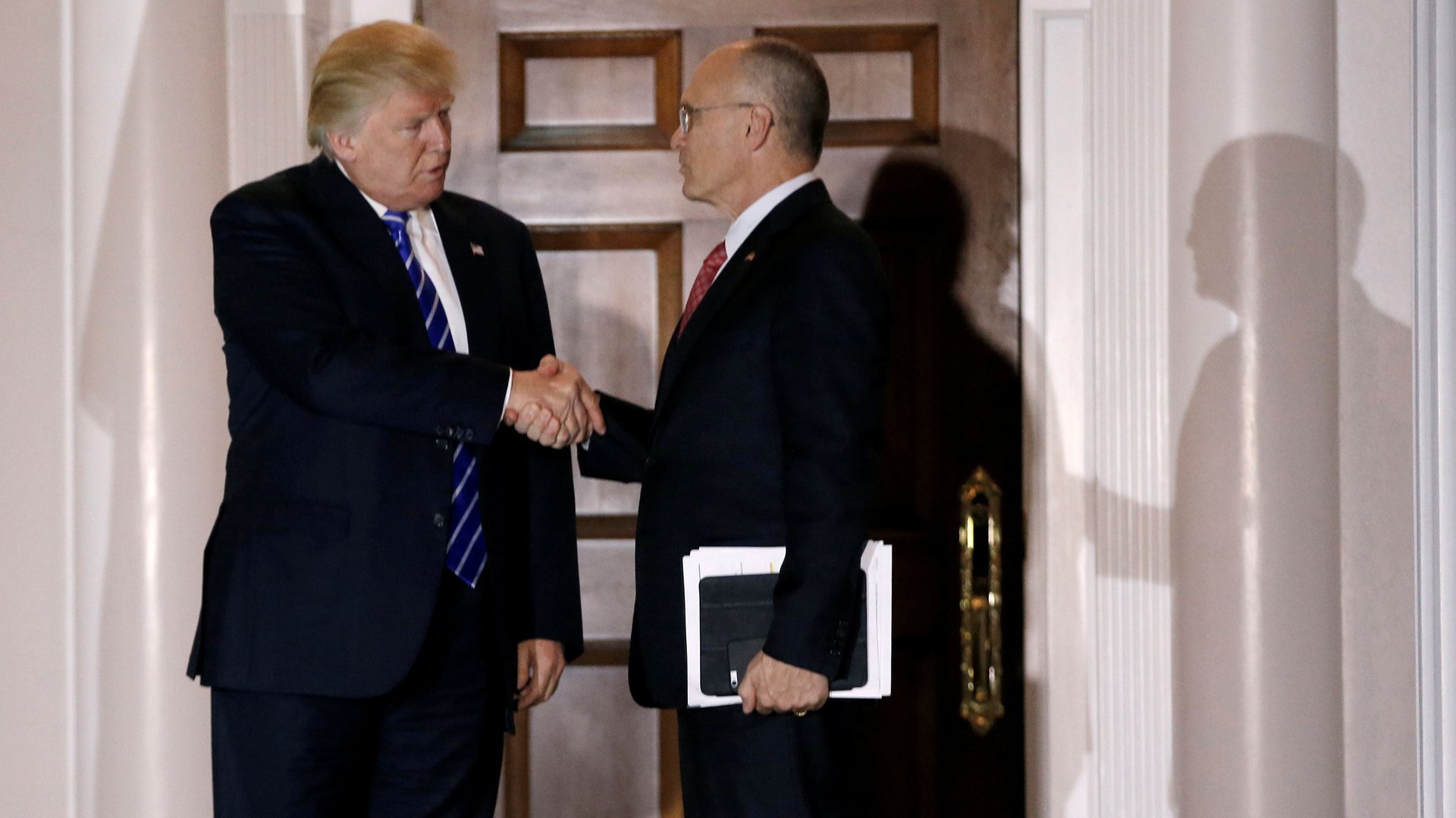Trump and his nominee for labor secretary disagree on almost everything about the future of work
CKE Restaurants CEO Andy Puzder, who is US president Donald Trump’s nomination for labor secretary, has strong opinions about how to create American jobs. They just aren’t the same opinions as Trump’s.


CKE Restaurants CEO Andy Puzder, who is US president Donald Trump’s nomination for labor secretary, has strong opinions about how to create American jobs. They just aren’t the same opinions as Trump’s.
Puzder—whose much-delayed confirmation could be in peril after he admitted to hiring an undocumented immigrant as a house cleaner—has during his tenure at CKE been responsible for thousands of people employed by Hardee’s and Carl’s Jr., restaurants of which CKE is the parent company.
But Puzder’s feelings on government involvement in labor are perhaps best outlined in a book he co-authored with entrepreneurship professor David Newton, titled Job Creation: How It Really Works and Why Government Doesn’t Understand It. In the book, Puzder argues against government incentives and taxes aimed at creating jobs. “Economic systems dependent on factors other than entrepreneurial creativity and ambition historically have fared very poorly,” he writes.
Trump, meanwhile, has suggested or enacted a number of measures aimed at inserting government into companies’ decisions about their employees. He’s vowed to create a “very major” border tax on firms that move some operations overseas, provided $7 million in financial incentives for one company to keep jobs in the US, and has said he will implement immigration policies that “ensure that open jobs are offered to American workers first,” despite no evidence that immigrants actually “take” Americans’ jobs.
Trump has also promised to “spur $1 trillion in infrastructure investment over 10 years” through public-private partnerships and tax incentives. Puzder, by contrast, wrote in his book that “government-created jobs outside of the government itself, such as those created by building roads or bridges, are similarly tax-consuming rather than self-sustaining. When the road or bridge is complete, the job is over and the resulting road or bridge produces no ongoing income (unless there is a toll).”
Likewise, while Trump has pressured companies like General Motors to keep jobs and factories inside the US, Puzder has himself moved a small number of jobs overseas in order to save money and improve service.
The two also differ on immigration. Trump has used the specter of stolen jobs to argue for more restrictive immigration policies, while Puzder has written that the “best way to protect American workers is to generate economic growth. This is not synonymous with aggressively restricting immigration.” (He later minimized their disconnect on this issue in a Wall Street Journal op-ed, saying that Trump’s proposals “are reasonable and sensible given that voters demand action.”)
Finally, although Trump has focused almost exclusively on the threats presented by foreign workers, Puzder has at least mentioned automated ones. Robots, he once said, are “always polite, they always upsell, they never take a vacation, they never show up late, there’s never a slip-and-fall, or an age, sex, or race discrimination case.” He has suggested that raising the federal minimum wage (which he opposes) would “make automation a more viable option for business.” Many economists argue that automation’s impact on jobs will be at least as significant as that of outsourcing and trade deals.
To be fair, if Puzder is confirmed as labor secretary—employing an undocumented immigrant has derailed past cabinet nominations—he will not be setting economic policy, negotiating trade deals, creating incentives for infrastructure projects, or holding much power at all when it comes to many of the issues over which he and Trump disagree.
But the US Department of Labor, among other responsibilities, does enforce rules related to workplace safety, workplace discrimination, and employer-provided benefits. In Puzder’s book, he calls for a “moratorium on new regulations while we conduct an independent bipartisan cost-benefits analysis with the goal of reducing regulation.”
On this point at least, he and Trump seem to agree. Last week, Trump signed a vague executive order calling for the dismantling of two regulations for every new one passed.